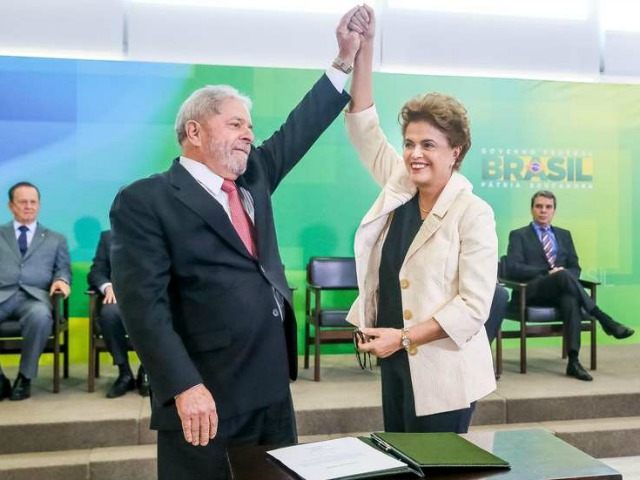Ousted Brazilian President Dilma Rousseff revealed that her predecessor, Luiz Inácio “Lula” da Silva, plans to run for president again in 2018, despite being the subject of an extensive corruption probe that strengthened calls for Rousseff’s impeachment.
President Rousseff, of the nation’s socialist Workers’ Party (PT), has been making the media rounds in Europe, revealing the news in an interview with France’s L’Express. She couched the announcement in the accusation that her removal was an attempt to keep da Silva out of power, as well. “The main reason for the coup d’etat [legal impeachment] is to prevent Lula from presenting himself as candidate for president,” she claimed. “Today, despite all intentions to destroy his image, Lula remains one of the most beloved people. That is why he is going to run in the next election,” she said.
She did not elaborate on this decision or how she became privy to it, instead discussing her impeachment, which she repeatedly refers to as a “coup” and asserted that it was “profoundly unjustified.”
Rousseff also did not mention da Silva’s repeat presidential ambitions during a previous interview published Monday with the UK’s The Independent. In that interview, she focused on a message of female empowerment and attacks on the Brazilian judges and politicians who impeached her for various executive orders directly responsible for the economic tailspin currently occurring in Brazil. She refused to accept that any international powers encouraged the impeachment, arguing, “We’re competent in the art of producing a coup here in Brazil. This coup was endogenous. The responsibility for it lies with local oligarchies.”
Rousseff also claimed she was a victim of a shift in global popular attitudes against tolerance of incompetent global elites:
I think there is discontent, a general malaise with politics, with political representation. … I think at that moment, we live in a state of malaise with this system of representation, not just in Brazil, but all over the world. Even when you take into consideration that our government always had an agenda of popular participation. The Brexit, talking about today, explains a bit about what’s happening everywhere, from the left to the right spectrum.
Lula da Silva appointed Rousseff his minister of energy during his mid-aughts tenure. He abruptly stormed back into the public eye in the midst of investigations related to Operation Car Wash, an extensive corruption scheme operating out of the state-run oil corporation, Petrobras. Da Silva was detained in March in relation to the discovery of several properties authorities had reason to believe may have been bought with government money.
In response to da Silva’s arrest, Rousseff fired her chief of staff and appointed da Silva, granting him executive immunity from the Petrobras investigation. Wiretaps released following the appointment indicated that Rousseff had planned to add da Silva to her cabinet in the event that law enforcement got too close to finding him guilty of corruption. The da Silva investigation prompted some of the largest protests in Brazil’s history, with more than three million people taking to the streets to demand Rousseff be impeached. Both houses of the Brazilian Congress voted to impeach her, replacing her with Vice President Michel Temer, though on charges unrelated to da Silva or Petrobras.
Temer remains significantly more popular than Rousseff, though both are widely reviled. A poll released Friday found that 66 percent of Brazilians do not trust Temer, nearly twenty percent less than Rousseff’s 80 percent distrust rating.

COMMENTS
Please let us know if you're having issues with commenting.